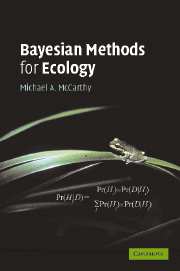Book contents
- Frontmatter
- Contents
- Preface
- 1 Introduction
- 2 Critiques of statistical methods
- 3 Analysing averages and frequencies
- 4 How good are the models?
- 5 Regression and correlation
- 6 Analysis of variance
- CASE STUDIES
- 7 Mark-recapture analysis
- 8 Effects of marking frogs
- 9 Population dynamics
- 10 Subjective priors
- 11 Conclusion
- APPENDICES
- References
- Index
10 - Subjective priors
Published online by Cambridge University Press: 05 June 2012
- Frontmatter
- Contents
- Preface
- 1 Introduction
- 2 Critiques of statistical methods
- 3 Analysing averages and frequencies
- 4 How good are the models?
- 5 Regression and correlation
- 6 Analysis of variance
- CASE STUDIES
- 7 Mark-recapture analysis
- 8 Effects of marking frogs
- 9 Population dynamics
- 10 Subjective priors
- 11 Conclusion
- APPENDICES
- References
- Index
Summary
Because priors can have an important influence on the posterior distributions, their construction needs to be logical and repeatable. Subjectively generated priors, when combined with new data using Bayes' rule, indicate how a person's belief in parameter values should be updated to accommodate the new data. It is not surprising that such subjective treatments of knowledge raise concerns among scientists (e.g. Dennis, 1996). Is one person's subjective judgement a particularly valid basis for making scientific inferences?
Subjective judgement is useful for science in several circumstances. These include using subjective judgement to help interpret data, understanding how data can turn differences of opinion into agreement, and using subjective judgements coherently and explicitly in cases where time, resources and data are limited. Bayesian methods in these cases provide a more transparent treatment of that subjective judgement than either pretending it does not exist or considering the judgements qualitatively. An advantage of a Bayesian approach is that the subjective judgement can be combined logically with data. However, the use of subjective judgement is not inherently Bayesian; other approaches are available (Ayyub, 2001).
The process of eliciting subjective judgements should be documented and repeatable. Individual elicitation case studies differ in how questions are asked, how differences of opinion are handled, and how elicited information is used and combined with other sources of data (Ayuub, 2001; Burgman, 2005).
- Type
- Chapter
- Information
- Bayesian Methods for Ecology , pp. 225 - 243Publisher: Cambridge University PressPrint publication year: 2007
- 2
- Cited by



